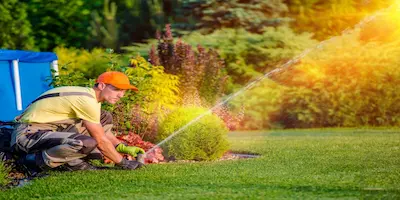
The Grounds Guys offer expert guidance on selecting and installing the right irrigation system for your lawn. Key considerations include:
|
As a commercial property owner, it is essential to take the steps necessary to maintain and improve your property - which includes landscaping. One way to do this is by installing an irrigation system to keep your commercial property landscape looking lush, green, and appealing to tenants and investors alike! If you need to set up an irrigation system for your commercial property, there are a few factors to consider:
Choose an Irrigation Technique
When setting up an irrigation system for your commercial property (or commercial properties), numerous methods can be used. Each method is very different and beneficial depending on the specific needs of your landscaping. However, choosing the wrong irrigation system could result in costly, inefficient irrigation that fails to accomplish the goal of maintaining a lush, green look for your property. Here are four of the most popular irrigation techniques to consider for your property:
Surface / Flood Irrigation
Surface irrigation systems use gravity to distribute water into the soil. It is also known as flood irrigation because it allows water to flow into specific areas based on the layout of the ground. This method of irrigation is popular with commercial property owners because it requires less manual labor, can cover large areas of land, and is not negatively influenced by winds or sentiments. Though surface irrigation systems are among the oldest and most common irrigation methods, it is not as efficient as other techniques because the flow of water is not as targeted as with other methods.
Subsurface Irrigation
Subsurface irrigation distributes water through tubes and emitters buried just below the surface of the ground. This type of irrigation system is best used in arid, hot, windy, or sandy soil environments because it helps minimize the amount of surface water lost through evaporation. It also helps to reduce the number of weeds. Since the system is below the soil’s surface, it can lessen the likelihood of damage to the system caused by animals or machinery, which can lower maintenance costs. One downside is the potential that pipes or emitters can become clogged with dirt or sediment and reduce water flow. Therefore, it is always a good idea to periodically check the system for damage, clogs, or leaks.
Sprinkler Irrigation
The sprinkler irrigation method applies water to the landscape in a way that mimics rain. The water is pumped through a series of pipes and eventually sprayed through a sprinkler head which breaks the water into tiny drops that are distributed over a specific area. Sprinkler systems are excellent for large or small commercial property plots since water can be directed to specific areas of need. Fertilizer and chemical treatments can also be used throughout the system to evenly treat the entire property with the necessary nutrients. But as with other above-ground irrigation systems, there is always a chance a sprinkler can be damaged or malfunction. Therefore, periodic maintenance is needed to ensure the system is operating correctly.
Drip Irrigation
Drip irrigation systems, also known as a trickle irrigation system, enable water to drip slowly to plants through narrow tubes containing emitters. These emitters conserve water by delivering it directly to the plant’s base. If your commercial property is on uneven ground, a drip irrigation system can help save time and money by delivering water more efficiently to the source. This method will also discourage weed growth and prevent fungal disease from developing in plants and flowers.
Consider Slope
One factor that many commercial property owners and managers fail to consider when choosing and setting up an irrigation system is the slope of their landscape. For example, subsurface and sprinkler irrigation is a lot more effective, practical, and efficient for watering a sloped landscape than surface or drip irrigation. You can also install timers, master valves, and sensing equipment, which will help ensure your sloped landscape remains sufficiently watered. Reverse-flow valves and compensating and regulating devices can also help you manage irrigation of uneven grounds, around retaining walls, and more.
Smart Controllers
If you haven’t already done so, consider upgrading your irrigation system controller to a Smart Controller. Today’s smart irrigation controllers automatically adjust watering based on highly accurate, internet-sourced local weather data. The system looks at the forecast and past history to ensure that just the right amount of irrigation is applied to your property. The system also allows you to turn the sprinklers system on and off remotely, via an app on your phone. The app also helps you schedule watering time and duration. These features can add significant savings to your water bill, and save you time too!